Lesbian couple give birth to each other’s baby in UK first

Emily Patrick and Kerry Osborn have made history in the UK by being the first to give birth to each other’s babies. (twomumstwobuns)
Lesbian couple Emily Patrick and Kerry Osborn have made UK history by being the first to give birth to each other’s babies via IVF, but they say they “never set out to be pioneers”.
The couple, who have been together for seven years, were able to conceive their sons, 11-day-old Ezra and 10-week-old Elvis, through a process known as simultaneous reciprocal IVF – a procedure which set them back around £25,000.
Their success marks the first time the procedure – which allows lesbian parents to simultaneously share in the pregnancy process, with one supplying eggs and the other carrying the baby – has been carried out in the UK.
Ezra, who was conceived using Emily’s fertilised egg, was carried by Kerry, while Elvis was carried by Emily using Kerry’s egg. Their eggs were fertilised by a Dutch-German sperm donor.
In an interview with the Metro, the couple, who document their motherhood on Instagram at TwoMumsTwoBuns, say they feel greater maternal responsibility to the baby which they each carried, although they love them equally.
Speaking to the Daily Mail Patrick, 38, said: “I was always the less maternal one but I’ve found a whole different level of love, like a new chamber in my heart, for our babies.”
Osborn, 35, said: “We never set out to be pioneers but we hope we’ve shown other people in the LGBTQ+ community that this is achievable.”
Meanwhile, a lesbian couple who live in Gloucestershire recently claimed they were refused an NHS IVF referral unless they could “prove” they “were trying” for two years.
Maz and Steph Davis-Hyde didn’t give up on their dream of a family and instead opted to undergo private treatment.
Despite being unable to go through with IVF via the NHS, the couple credited the organisation for its “amazing” care during both pregnancies and labours adding that they were “very well looked after”.







